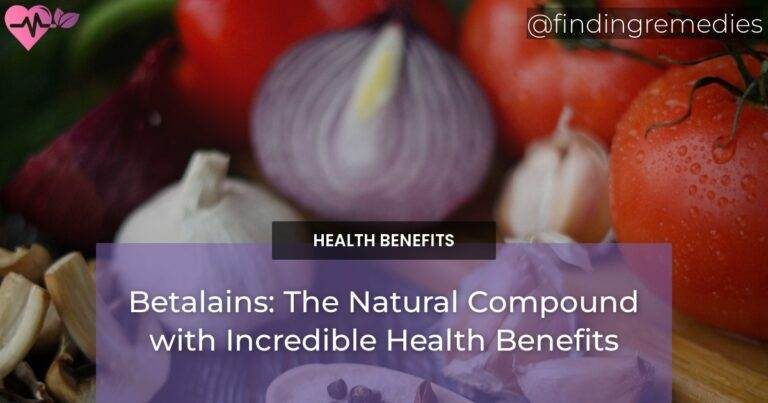Betalains are a type of natural compound that is found in several fruits and vegetables. These compounds offer a variety of health benefits due to their unique antioxidant and anti-inflammatory qualities. Betalains are found in a wide variety of plant-based foods such as beets, Swiss chard, rhubarbs and cactus pandas. While many people are unaware of the potential health benefits of betalains, the compound has been studied extensively for its health-promoting qualities. This article will explore the amazing healing powers of this natural compound and discuss what makes it such an important addition to any healthy diet. From boosting immunity to aiding in digestion, betalains offer a wide range of benefits that make this plant-based compound essential to include in any wellness routine.
Table of Contents
Introduction to Betalains
Betalains are a group of phytonutrients that give fruits and vegetables their bright colors. They are natural compounds that belong to the same family as antioxidants, and they have been studied for their potential health benefits. Betalains are classified into two groups: betacyanins, which give produce a red to violet color, and betaxanthins, which give produce a yellow to orange color. Some of the richest sources of betalains include beets, cactus fruits, and Swiss chard.
Types of Betalains
There are over 50 different types of betalains, with betanin and vulgaxanthin being the most commonly studied. Betanin is a type of betacyanin found in beets, while vulgaxanthin is a type of betaxanthin found in yellow beets and some cactus fruits.
Sources of Betalains in Food
Some of the best food sources of betalains include:
- Beets and beetroot juice
- Swiss chard
- Red and yellow cactus fruits
- Rhubarb
- Purple sweet potatoes
- Red spinach
- Prickly pear cactus
Health Benefits of Betalains
ALSO READ
Betalains as Antioxidants
Betalains are potent antioxidants that help protect the body from oxidative stress. Oxidative stress can lead to chronic diseases, including cancer, cardiovascular disease, and Alzheimer’s disease. Betalains neutralize free radicals, which can damage cells and cause inflammation. By reducing oxidative stress, betalains help promote overall health and well-being.
Anti-inflammatory Properties of Betalains
In addition to their antioxidant properties, betalains also have anti-inflammatory properties. Chronic inflammation is believed to be a contributing factor to many chronic diseases, including arthritis, heart disease, and cancer. Betalains help reduce inflammation by inhibiting the production of inflammatory cytokines, enzymes, and other molecules in the body.
ALSO READ
Potential in Chronic Disease Prevention and Treatment
Due to their antioxidant and anti-inflammatory properties, betalains have been studied for their potential in preventing and treating chronic diseases. Some of the conditions that betalains may be beneficial for include:
- Cardiovascular disease
- Diabetes
- Arthritis
- Cancer
- Alzheimer’s disease
- Parkinson’s disease
Betalains and Brain Health
Betalains may also be beneficial for brain health. They have been shown to protect brain cells from damage and reduce inflammation in the brain. This may offer protection against neurodegenerative diseases like Alzheimer’s and Parkinson’s.
Role in Kidney Disease Prevention and Treatment
Betalains have also been studied for their potential in preventing and treating kidney disease. They help reduce oxidative stress and inflammation in the kidneys, which can help prevent kidney damage. Betalains may also help improve kidney function in people with existing kidney disease.
Bioavailability and Safety
Bioavailability of Betalains
The bioavailability of betalains varies depending on the source and preparation. Studies have shown that betalains from beets are more bioavailable than those from other sources. The bioavailability of betalains can be improved by cooking or juicing produce that contains them.
Safety of Betalains
Betalains are generally safe for consumption, and there have been no reported cases of toxicity. However, some people may experience a harmless condition called beeturia after consuming beets. Beeturia is characterized by red or pink urine after consuming beets, and it is caused by the betalain pigments.
Risk Factors Associated with Betalain Consumption
While betalains themselves are safe, some foods that contain them may be high in oxalates. Oxalates can contribute to kidney stone formation, so people at risk for kidney stones should be cautious when consuming foods high in oxalates, such as beets and Swiss chard.
Human Intervention Studies
Evidence from Human Intervention Studies
There have been several human intervention studies conducted on the health benefits of betalains. These studies have shown that betalains can help reduce inflammation, lower blood pressure, and improve blood vessel function. Betalains have also been shown to improve exercise performance and reduce muscle soreness.
Recommended Dosage of Betalains
There is no established recommended dosage of betalains. However, consuming a variety of colorful fruits and vegetables, including those high in betalains, can offer a range of health benefits.
Betalains in Functional Foods
Betalains are increasingly being used in functional foods, such as sports drinks and recovery shakes. These products are marketed to athletes for their potential to improve exercise performance and reduce muscle soreness.
Conclusion
Summary of Health Benefits
Betalains are natural compounds found in many colorful fruits and vegetables. They offer a range of health benefits, including antioxidant and anti-inflammatory properties, potential in chronic disease prevention and treatment, and benefits for brain and kidney health. Betalains are generally safe for consumption, but people at risk for kidney stones should consume foods high in oxalates with caution.
Future Research Directions
While there is already a significant body of research on the health benefits of betalains, there is still much to be studied. Future research directions may include investigating the potential of betalains in cancer prevention and treatment, as well as the potential of betalain-rich functional foods in promoting overall health and well-being.

